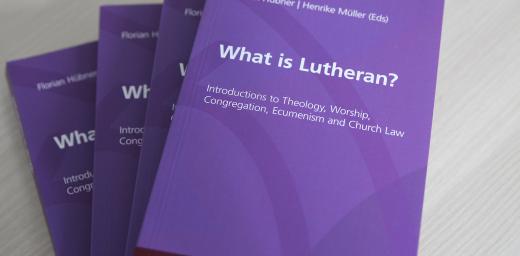Refugee crisis: governments must work more closely

Church of Sweden Archbishop Antje Jackélen, WCCâs Marianne Ejderstein (moderator) and General Secretary Olav Fykse Tveit; EKD Council Chairperson Heinrich Bedford-Strohm; and Doris Peschke, general secretary of the Churchesâ Commission for Migrants in Europe Photo: LWF/Juliane Ziegler
High-level church leaders’ international meeting in Munich
(LWI) – How can and should churches position themselves in the refugee crisis in Europe?
That was the issue for 35 bishops and church leaders from 20 countries at a consultation in Munich, Germany, representing Protestant and Orthodox churches from Europe, the Middle East and Africa, as well as the Roman Catholic Church and the Anglican Communion.
Besides discussing ways of demonstrating greater unity amongst themselves, the leaders called for closer cooperation between governments and urged refugees to be received with dignity.
Swedish Archbishop Antje Jackelén said Europe was currently on a “humanitarian honeymoon.” She underlined the great challenge for Europeans was accepting that there would be changes as the crisis lasted longer, and the fear that refugees were sometimes rejected.
Churches have a special role to play in drawing attention to the fact that refugees are human beings with human needs and not objects to be ‘distributed’ from country to country, she said.
Bishop Heinrich Bedford-Strohm of the Evangelical Lutheran Church in Bavaria and chair of the Council of the Evangelical Church in Germany, recalled that Jesus, too, came to the world as a stranger.
He underlined the fact that the responsibility of churches must be expressed in tangible assistance and solidarity with refugees, as well as in advocacy and dialogue with the respective governments. “If we tackle it properly, then the assistance will be sustainable,” Bedford-Strohm said.
The church leaders called for greater cooperation with Islamic leaders, particularly since the refugees coming to Europe are largely Muslims. Jackelén likewise stressed the importance of dialogue with the Muslim communities, adding that undue media focus on extremist Islamism was creating a one-sided view of Islam.
World Council of Churches General Secretary Olav Fykse Tveit appealed to global political leaders to finally get down to finding a resolution to the Syrian conflict. This “disaster” had to be stopped, he said.
Metropolitan Gabriel of Nea Ionia and Filadelfeia from Greece said his church was trying to assist, despite the strained economic situation. For example, the church was endeavoring to give a decent reception to the many refugees arriving in Lesbos.
Lutheran World Federation assistant general secretary for International Affairs and Human Rights, Ralston Deffenbaugh said, “We churches must be bearers of hope – not only for the refugees but also for the volunteers and host communities.”
Just as important as practical support for refugees is personal contact and extending the hand of friendship towards refugees. It was equally important that there should be no reduction of assistance in the refugees’ countries of origin and in neighboring countries. One example of this was Jordan, he noted, where the LWF supports Syrians living in refugee camps and in host communities.
Deffenbaugh emphasized LWF’s cooperation with Islamic Relief Worldwide. “Religion is so often seen as a source of conflict. But people of faith also work together and, in so doing, they can send a message of peace,” he added.
(From LWI correspondent Juliane Ziegler)





